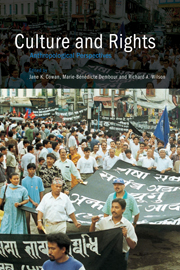Book contents
- Frontmatter
- Contents
- List of contributors
- Preface
- 1 Introduction
- Part I Setting universal rights
- 2 Changing rights, changing culture
- 3 Following the movement of a pendulum: between universalism and relativism
- 4 Imposing rights? A case study of child prostitution in Thailand
- 5 Gendering culture: towards a plural perspective on Kwena women's rights
- 6 Between universalism and relativism: a critique of the UNESCO concept of culture
- Part II Claiming cultural rights
- Index
4 - Imposing rights? A case study of child prostitution in Thailand
Published online by Cambridge University Press: 05 June 2012
- Frontmatter
- Contents
- List of contributors
- Preface
- 1 Introduction
- Part I Setting universal rights
- 2 Changing rights, changing culture
- 3 Following the movement of a pendulum: between universalism and relativism
- 4 Imposing rights? A case study of child prostitution in Thailand
- 5 Gendering culture: towards a plural perspective on Kwena women's rights
- 6 Between universalism and relativism: a critique of the UNESCO concept of culture
- Part II Claiming cultural rights
- Index
Summary
Introduction
Anthropology has traditionally been associated with a relativistic understanding of moral issues, a position which is increasingly problematic in a period of globalization. The creation of an international community sharing the language of human rights and the values of liberalism considerably complicates the way anthropologists now have to think about the specific cultures with which they become engaged. Local understandings of culture, which anthropologists have hitherto emphasized, no longer seem to do justice to the demands of globalization, in which local law and custom are subsumed under international treaties and universal human rights legislation. Contentious issues such as child prostitution raise important concerns about whether a universal morality can exist and, if it can, what form it takes and whether it can, or should, be codified. The local knowledge of the anthropologist now has to engage with the universalizing propensity of international law and transnational obligations.
The issue of child prostitution problematises this new perspective not least by emphasizing how local variations and traditions challenge any simplistic reduction of local phenomena to universal facts. The idea of children selling sex provokes such feelings of abhorrence that one would expect child prostitution to be an area in which any potential conflict between ‘rights’ and ‘culture’ is easily resolved. One would accordingly argue that children have an overwhelming right to be protected from prostitution, and that there can be no place for a debate in which issues of culture, social background or local realities are taken into account.
- Type
- Chapter
- Information
- Culture and RightsAnthropological Perspectives, pp. 80 - 101Publisher: Cambridge University PressPrint publication year: 2001
- 23
- Cited by

